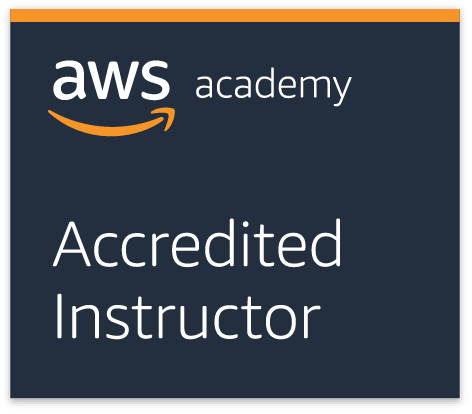
Course Outline: The COMP 490 Cloud Foundations course is intended for students who seek an overall understanding of cloud computing concepts, independent of specific technical roles. It provides a detailed overview of cloud concepts, including storage, databases, virtual compute instance and networking in the cloud, as well as security, architecture, pricing and performance. This course is intended for students with a basic understanding of Computer Science concepts, and background in networking, databases and operating systems is recommended, but not required.
When and Modality: Winter session 2019/20, from December 21, 2019, to January 19, 2020, online.
Technical details: Given our partnership with AWS Academy, we are going to use AWS cloud computing resources, including free AWS accounts for students with pre-loaded credits. We are going to compare AWS to other cloud computing providers such as Google Cloud and Microsoft Azure. As the course covers all the material in AWS Academy Cloud Foundations (ACF), those students who are interested will be given vouchers to pass the ACF certification.

Instructor: Michael Soltys, michael.soltys@csuci.edu, professor and chair of Computer Science, and an accredited AWS instructor, as a Certified Solutions Architect – Associate. CSU Channel Islands is part of the AWS Academy, and authorized to deliver the curriculum.
COURSE DETAILS
Detailed Course Outline: AWS Academy Cloud Foundations (ACF).
To ensure success in this course, it is preferred that you have:
- General technical and business IT knowledge (MIS 310 or MGT 307 at CI)
- A general familiarity with cloud computing concepts
- A working knowledge of distributed systems
- Familiarity with general networking concepts (COMP 429 at CI)
- And a working knowledge of multi-tier architectures (COMP 262, 362 at CI)
More Course Details:
- We are going to hold 12 online meetings using Zoom. Each meeting will be under two hours. There will be about 3 meetings each week, taking into consideration holidays (Christmas day, etc.). I will announce the exact dates later.
- The first meeting will be on December 23, at 10am (PST). An invitation to the Zoom meeting has been placed as an Announcement on the Canvas page of the course. During the first meeting we will discuss the setup of the course (AWS accounts, labs, etc.).
- The course Canvas page is: https://cilearn.csuci.edu/courses/10772
- The online meetings will consist in slide presentations by the instructor; the slides are copyrighted by AWS, and hence cannot be shared.
- The meetings will be recorded.
- There is no textbook for the course, as all the material is available as white papers from AWS (https://aws.amazon.com/whitepapers) as well as AWS Educate lecture modules. You will be given accounts to all these resources.
- The requirement for the class is a standard web browser, so that you can:
- participate in the Zoom sessions; and login into:
- your AWS Educate account (AWS console);
- your AWS Training account (modules and assessments);
- your Vocareum labs account;
- your VitalSource Bookshelf account;
- as well as your Canvas account.
- Students do not need to buy anything, but students need access to a computer from home; all material, and all necessary accounts, will be provided. Students need to install on their laptop the following (free) tools: an SSH client, and a Microsoft Remote Desktop client.
- The course grade will be as follows: 30% for completing the modules, 30% for completing the labs, and 40% for the final exam.
- Students will use the Canvas discussion feature as a forum; the instructor will moderate the forum to some extent, but students are encouraged to answer each other.
Course objectives:
- Define cloud concepts using AWS as main example
- Explain cloud economics: define pricing models and the cloud value proposition
- Describe core services in the cloud using AWS as main example: define characteristics of deployment/operation and review common use cases
- Explain cloud security: review the AWS shared responsibility model – and the difference between security “in” the cloud and “of” the cloud; review basic security and compliance
- Describe basic cloud architectural principles using AWS as main example
- Review cloud billing and support services in AWS
ABET Student Learning Outcome:
- ABET Student Learning Outcome (2): Design, implement, and evaluate a computing-based solution to meet a given set of computing requirements in the context of the program’s discipline.